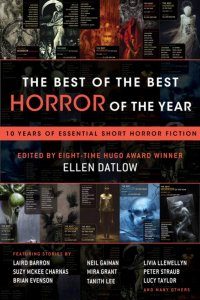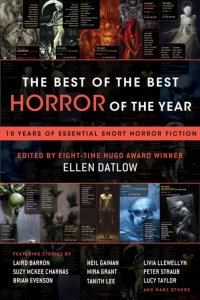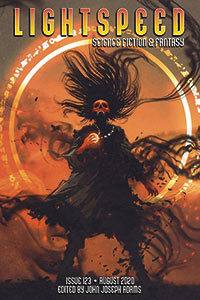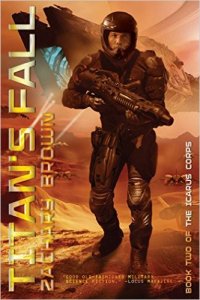Ian Mond Reviews The Best of the Best Horror of the Year, Edited by Ellen Datlow
 The Best of the Best Horror of the Year: 10 Years of Essential Short Horror Fiction, Ellen Datlow, ed. (Night Shade Books 978-1597809832, $17.99, 432pp, tp) October 2018.
The Best of the Best Horror of the Year: 10 Years of Essential Short Horror Fiction, Ellen Datlow, ed. (Night Shade Books 978-1597809832, $17.99, 432pp, tp) October 2018.
When arguably the finest editor of horror fiction decides to do a ten-year retrospective of the genre you feel obligated as a critic to make pronouncements about the health of the field and how it’s changed (for the better or worse) over the years. Personally, I’d rather just talk about the fiction. Ellen Datlow’s The Best of the Best Horror of the Year: 10 Years of Essential Horror Fiction collects, as the title suggests, 30 stories from her Best Horror of the Year anthologies. With the quality ranging from very good, to fantastic, to sublime, there just isn’t the space to discuss them all.
I’ll focus on my four favourites, starting with the opening piece of the anthology, Suzy McKee Charnas’s “Lowland Sea”. Just like Ling Ma’s Severance, Charnas proves there’s still mileage in the apocalyptic killer flu. Miriam, a native of Africa, is sold by her father to Victor, a famous actor who is “accustomed to buying people.” Victor and his entourage, which includes Miriam, the nanny to Victor’s children, are in Cannes for the premiere of his movie when the “Red Sweats” hit. To escape the epidemic, Victor’s retinue head to his French Country estate. Miriam soon discovers that for Victor, everyone, even his wife and children, are dispensable. It’s a bleak but compelling story about modern slavery and the widening gap between the powerful (mostly white men) and everyone else.
In Tanith Lee’s “Black and White Sky”, a magpie rises into the heavens early one summer’s morning. About 30 seconds later it’s followed by a second magpie, and then a third, and then a fourth, and so on. Across the British Isles – and only the British Isles – magpies are shooting out from holes in the ground, launching themselves into the firmament, damaging aeroplanes, blotting out the sun and cutting the UK off from the rest of the world. If I didn’t know that this eerie, strange, astonishing story had been published eight years ago, I’d have thought it was a commentary on the stupidity of Brexit. It’s a melancholy reminder of how much the genre will miss Tanith Lee.
The piece I found the most unsettling was E. Michael Lewis’s “Cargo”. Set during the events of the Jonestown massacre in 1978, the story deals with those tasked with the horrible, scarring job of hauling the body bags back to America. This responsibility falls on Tech Sergeant Davis, Loadmaster of a Lockheed Starlifter, who ensures each coffin is correctly fastened and secured. They also evacuate two passengers from Guyana, including an airman who was one of the first on the scene at Jonestown and, not surprisingly, is traumatised by what he saw. It’s the airman who hears the sound of children singing while they’re in the air. Generally, subject matter this disturbing and gut-wrenching wouldn’t require a supernatural element, but in the case of “Cargo”, it only deepens the tragedy of Jonestown. I had to take a break after reading this story, which is rare for me, given my thick skin.
If I had to pick a favourite out of the anthology, it would be Nathan Ballingrud’s “Wild Acre”. Following a spate of vandalism at the Wild Acre housing development site, three workers take on the responsibility of protecting the development. One night they are attacked, not by the vandals but by a werewolf. Jeremy, rather than help his mates (he has a rifle in his car), escapes the slaughter. What follows is a harrowing story about survivor’s guilt. What’s special about “Wild Acre”, what sets it apart from the other terrific stories in the collection, is that Ballingrud isn’t so much interested in the supernatural catalyst but in what follows next, what happens to Jeremy and the families of the dead.
While those are the stories that affected me the most, there are so many others I could have spoken about. For example, I loved the masculine, gravelly voice of Lucy Taylor’s “Wingless Beasts”, even if the protagonist is one twisted bastard. No less disturbing is “The Ballad of Ballard and Sandrine”, Peter Straub’s surreal, oblique, and discomforting tale of two people on a luxury boat to nowhere. Livia Llewellyn’s difficult to pronounce “Allochthon” brilliantly blends Lovecraftian cosmic horror and the mysteries of the natural world with the banality of being a 1930s company wife. Simon Bestwick’s “The Moraine” has echoes of Stephen King’s “The Raft” as a husband and wife hiking in the mountains of Lake Windermere face off against an unstoppable, ravenous monster. Adam Golaski’s “The Man From The Peak” is a truly terrifying vampire story, something I thought was no longer possible. Ramsey Campbell offers up the creepiest bingo game ever committed to fiction with his piece “The Callers”, and Brian Evenson wins the award for best opening line in the anthology: “No matter which way we turned the girl, she didn’t have a face.” I could go on.
If I need to make a pronouncement – based on Datlow’s fantastic distillation of the genre – it’s that horror is alive, well, and still getting under people’s skin. If you have even a vague interest in dark fiction, then pick up this book.
This review and more like it in the December 2018 issue of Locus.
 While you are here, please take a moment to support Locus with a one-time or recurring donation. We rely on reader donations to keep the magazine and site going, and would like to keep the site paywall free, but WE NEED YOUR FINANCIAL SUPPORT to continue quality coverage of the science fiction and fantasy field.
While you are here, please take a moment to support Locus with a one-time or recurring donation. We rely on reader donations to keep the magazine and site going, and would like to keep the site paywall free, but WE NEED YOUR FINANCIAL SUPPORT to continue quality coverage of the science fiction and fantasy field.







